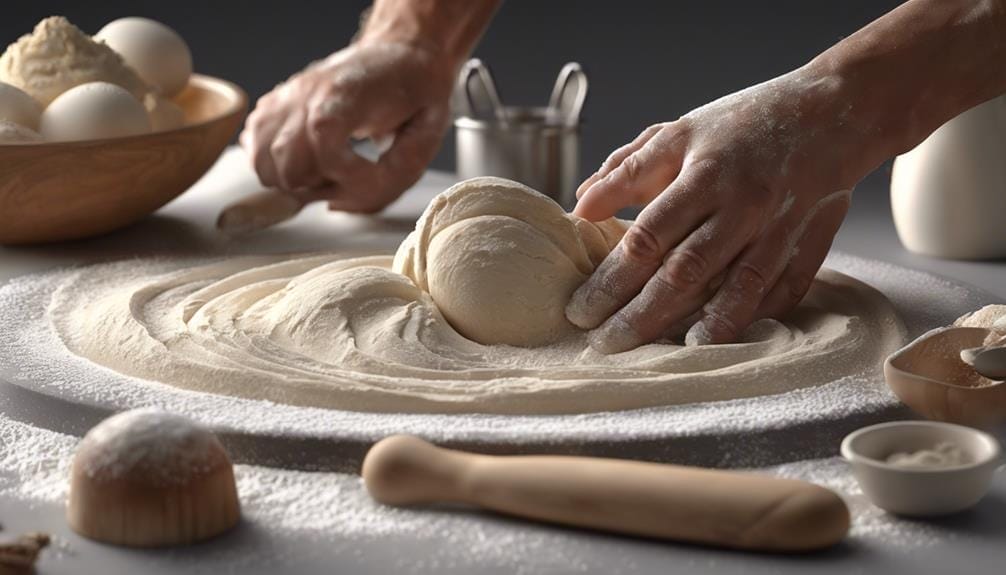When pricing your home baking business, investigate costs meticulously. Factor in ingredient, labor, and overhead expenses to set competitive prices that cover costs and generate profit. Regularly review pricing to stay in line with market trends. Understand the components of costs to price effectively and sustain your business. Research different pricing strategies for baked goods and consider factors like ingredient cost, labor, and overhead expenses. Strategically offer specials or discounts to attract more customers. Keep an eye on market pricing trends to adjust your strategy accordingly. For more insights on maximizing profitability, delve further into pricing strategies and profitability.
Legal Requirements for Home Baking
Understanding the legal landscape for home baking can be straightforward in Texas, where permits or licenses aren't required to sell your baked goods from home. This is due to the Texas Cottage Food Law, which allows individuals to start a home bakery without the need for a business license.
As you venture into the world of home-based bakeries, it's important to familiarize yourself with the licensing requirements under cottage food laws to make sure compliance with regulations.
When setting up your home kitchen for your home baking business, make sure to follow the guidelines outlined in the Texas Cottage Food Law. While health department intervention is limited unless there are consumer complaints, it's important to maintain a clean and safe environment for baking.
Moreover, if you plan on participating in farmer's markets or local events, be aware of any additional regulations that may apply.
Planning Your Bakery Menu
When planning your bakery menu, prioritize variety and creativity to attract a diverse customer base and keep them coming back for more. Offer a selection of baked goods such as cookies, breads, muffins, cupcakes, and cakes to cater to different tastes and preferences.
Make sure that your menu includes items that are shelf-stable to comply with regulations, allowing for safe storage and longer shelf life. Flexibility in your menu offerings is key to adapting to customer preferences and seasonal availability of ingredients. Consider experimenting with new recipes and flavor combinations to keep your menu fresh and exciting.
Education in Baking & Pastry Arts can provide valuable insights into a wide range of baked goods and techniques. Online programs offer convenient ways to practice baking in your home kitchen, helping you develop and perfect your signature bakery items. By incorporating your newfound knowledge and skills into your menu planning, you can create a unique and enticing selection of baked goods that will appeal to a broad customer base.
Obtaining Equipment and Supplies

Make sure you have the necessary equipment and supplies for your home bakery by stocking up on important items like cake tins, bread tins, cupcake wrappers, and piping bags. Compliance with Cottage foods laws is critical for your home baking business, so ensure your equipment and supplies meet the required standards. Some states may mandate separate storage for your bakery equipment to maintain compliance.
Keeping track of your supply costs is important for pricing your goods accurately and for tax purposes. Proper storage and organization of your supplies will help you operate efficiently and meet legal requirements. By investing in quality equipment and maintaining a well-organized storage system, you can set a solid foundation for your home baking business.
Keep in mind that being compliant with regulations, keeping costs in check, and staying organized are key factors in running a successful home-based bakery.
Pricing Strategies for Profitability
To guarantee profitability in your home baking business, calculate pricing based on ingredient costs, labor, overhead, and desired profit margin. Understanding the relationship between these elements is essential for setting competitive prices that align with market trends while covering all expenses and generating profit. Below is a table highlighting key factors to review when determining pricing strategies for your home-based bakery business:
| Key Factors | Considerations |
|---|---|
| Ingredient Costs | Determine the cost of all ingredients used in your recipes. Consider buying in bulk for cost savings. |
| Labor Costs | Calculate the time spent on baking, decorating, packaging, and administrative tasks to determine labor costs. |
| Overhead Costs | Include expenses like rent, utilities, insurance, and equipment maintenance in your pricing calculations. |
Regularly review your pricing strategy to make sure it remains profitable and reflects current market conditions. By understanding cost components and setting prices strategically, you can sustain and grow your home baking business effectively.
Baking Process and Tips

Achieving the best results in your home baking endeavors requires precise execution of the baking process and adherence to key tips for success.
To start a bakery business from home, make sure you preheat your oven to the correct temperature for even baking of your delicious baked goods.
Use high-quality ingredients like butter, flour, and sugar to elevate the flavor and texture of your treats.
Follow recipes accurately and measure ingredients carefully to guarantee successful baking outcomes.
Remember to allow your baked goods to cool completely before adding icing or frosting to prevent them from melting.
Investing in good quality bakeware and tools is crucial for consistent results in your home bakery.
Before selling homemade goods at farmers markets, check with local health departments for regulations and consider drafting a business plan.
Starting a home bakery requires a license in Texas, so make sure you comply with all legal requirements.
Let your passion for baking shine through in each delectable creation!
Marketing Your Home Baking Business
Utilize social media platforms like Instagram and Facebook to effectively showcase your baked goods and engage with potential customers. Social media is a powerful tool for marketing your home baking business.
Here are some strategies to help you promote your products and increase customer retention:
- Participate in local farmers markets, vendor events, and pop-up shops: These events provide excellent opportunities to connect with your community, introduce your baked goods to a wider audience, and network with other local businesses.
- Offer promotions, discounts, or loyalty programs: Incentivize repeat business by rewarding your customers for their loyalty. This can help increase customer retention and drive sales.
- Create visually appealing branding and packaging: Make sure your products stand out by investing in attractive branding and packaging. Visual appeal plays a significant role in attracting customers and building brand recognition.
- Collaborate for cross-promotion: Partner with local businesses, influencers, or food bloggers to reach new audiences and expand your reach. Cross-promotion can be a valuable tool in growing your home baking business.
Skill Assessment for Starting

Evaluating your baking skills through practice and appraisal is important for starting a home baking business successfully. Start by experimenting with different recipes and techniques to sharpen your craft.
It's essential to also assess your knowledge of food safety practices and regulations governing home baking businesses in your local area. Consider taking baking classes or courses to improve your skills and stay up-to-date with industry standards.
Identify areas where you may need improvement or additional training to make sure that your baked goods meet quality standards. Seek feedback from friends, family, or mentors to gauge your baking abilities objectively.
Constructive criticism can help you refine your skills and readiness to enter the market. Understanding the importance of skill assessment will set a strong foundation for your home baking business, ensuring that you deliver high-quality products that comply with food regulations and customer expectations.
Additional Resources and Articles
Explore different online resources and articles to access valuable insights and guidance for starting and growing your home baking business. When delving into the world of food production from home, it's important to make sure you're compliant with legal requirements.
Delve into these resources to navigate permits and licenses effectively:
- Learn about marketing strategies tailored to home-based bakeries to improve customer engagement.
- Investigate articles on pricing strategies that can help you effectively price your baked goods for maximum profit.
- Find resources on compliance with regulations to ensure your home bakery meets all necessary standards.
- Uncover tips on product development and expanding your business while considering the health benefits of your baked goods.
Frequently Asked Questions
Is a Home Baking Business Profitable?
To determine if a home baking business is profitable, consider factors like pricing, costs, and market demand. Analyze expenses, sales channels, and customer retention. Evaluate your competition, marketing strategies, and online presence. Manage time effectively for success.
Can You Bake at Home as a Business?
You can bake at home as a business, honing baking techniques, mastering recipe development, sourcing quality ingredients, and exploring pricing structures. Marketing strategies, packaging options, customer service, branding, online presence, and competition analysis are essential.
Do I Need a License to Sell Homemade Food in Texas?
You don't need a license to sell homemade food in Texas. Legal requirements include following cottage food laws, ensuring food safety, and obtaining necessary health inspections if prompted by consumer complaints. Consider marketing strategies, pricing, packaging, and customer feedback for success.
How Profitable Is Baking Business?
Baking business profitability hinges on smart pricing, quality ingredients, and effective marketing. By refining baking techniques, strategic pricing structures, and customer feedback loops, you can enhance profits, manage time wisely, and develop winning recipes.
Conclusion
To sum up, embarking on a home baking business can be a fulfilling venture with the right planning and preparation. By adhering to legal requirements, crafting a solid menu, investing in quality equipment, setting competitive prices, and effectively marketing your goods, you can transform your passion for baking into a successful business.
Remember to continually evaluate your skills, seek out resources, and stay informed on industry trends to guarantee the prosperity of your home baking business. Best of luck on your baking endeavor!